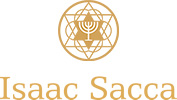Rosh Hashanah: the birth of the human being and his existential dilemma

Article published by Perfil on September 22, 2022
What is the story of Adam and Eve about? The first thing that is important to keep in mind is that the story of Adam and Eve intends to give us concrete lessons: it wants to lead us to reflect on human nature.
Rosh Hashanah is a date of reflection for the people of Israel, a reflection accompanied by a spirit of hope and renewal. According to the Hebrew tradition,on this date, the human being was created. Therefore, on this day we commit ourselves to take stock to redefine our lives and give them a transcendental meaning, in accordance with their original purpose.
The popular idea, based on the Biblical account, is that, when God created the human being, He placed him in Eden’s garden, a wonderful and paradisiacal place. There, humanity would live forever, connected with its Creator and in harmony with the environment that surrounded it. The initial plan was that Adam and Eve would have a utopian life of pleasure and well-being. However, Adam and Eve ate from the forbidden tree, the tree of the knowledge of good and evil, and because of this, they were expelled fromEden’s garden.
What is this story about?
Is it a mere fable or a mythological narrative of the ancient Hebrews? What is its background and the message that we can take for our lives?
The first thing that is important to keep in mind is that the story of Adam and Eve intends to give us concrete lessons: it wants to lead us to reflect on human nature. It wants us to ask ourselves the following question: What does it mean to be human? This basic existential question leads us to question the meaning of our life: What are we doing here? What is our goal? Even stronger: Which is my goal? The answer to these questions is essential to mark the path to be traced in our lives.
Adam and Eve are not merely the first people to populate the Earth. They are a symbol of humanity, that is, they represent the human being as such. The story of Adam and Eve, then, is the story of each one of us. They inhabited the Garden of Eden. That is to say, they led an ideal existence. However, this is not to say that they were without challenges or that they lived idly. The Creator Himself gave them a mission: protect and care for the world, using it harmoniously and protecting it from all destruction.
Rosh Hashanah is a date of reflection for the people of Israel.
The two of them lived in such a way that they understood intellectually, intuitively, the most elementary truth. They had a clear answer to the question: What is the goal of life? The person is in this world to avoid evil and do good, maintaining God’s creation. They had this knowledge because they were in harmony with themselves, their neighbor, the natural environment and God. They knew what their role was within the cosmos. If so, why did they corrupt and eat from the forbidden tree?
The answer is that Adam and Eve were self-aware, as is any human being. That same self-awareness that arouses curiosity and generates restlessness – that same capacity that made them quickly understand their mission – finds answers that stimulate human action. Sometimes those answers are flawed and lead us to make decisions that may be wrong.
The sense of the prohibition to eat the fruit of good and evil was a warning message: not to be carried away by unbridled desire or be guided by voluptuousness. Eating represents a worldly desire, necessary for survival. Food is a valid pleasure, but that should not be an objective in itself, but a means to have energy and dedicate yourself to what is really relevant.
If worldly pleasure becomes a goal, then values are upended. It begins to redefine good and evil and establish that good is immediate pleasure and evil is immediate sacrifice. This leads to a serious philosophy: that an act that provides pleasure is good even to the detriment of man’s goal, which is to preserve the integrity of the world, and sacrifice is bad even when that sacrifice is generated by the fulfillment of the duty to do good.
The act of eating also means feeding on something external and making it your own. That is to say, internalize something that was outside. When Adam and Eve were tempted by the appearance of the tree and ate, they integrated within themselves a new concept of good and evil. The consequence was the expulsion from the Garden of Eden. When the person begins to pursue petty interests, which arise from his temptations, he is located outside of paradise: happiness slips through his hands.
What can we do?
We can try to stop eating from the tree. That is, stop accommodating good and evil to our liking. Instead of being guided by immediate pleasure, we can start really looking for the good. We can begin to value what is important: love, family, kindness. In this way, we will manage to channel our energies and set out on the path of ethics and morality. Then we will find happiness.
Source: www.perfil.com

